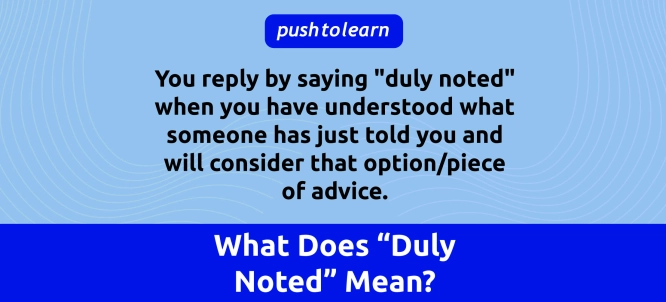by PushtoLearn
Duly Noted Meaning
Table of Contents
"Duly noted" is a formal phrase that means someone has acknowledged or recognized a point, comment, or suggestion, and will give it appropriate attention. It’s often used in professional or formal contexts to show that a message has been understood and will be considered.
Breaking Down the Phrase
-
Duly: This means "properly" or "in a fitting manner." It implies that something has been done appropriately or correctly.
-
Noted: This simply means "observed" or "recorded."
Together, "duly noted" means that something has been properly recorded and recognized.
Examples in Everyday Use
-
In a meeting, after someone makes a suggestion, a manager might respond:
"Your feedback is duly noted."
(Meaning: The manager acknowledges the feedback and will consider it.) -
In written communication:
"Your concerns are duly noted, and we will address them in the next meeting."

Common Uses
-
Workplace: A polite way to acknowledge a suggestion or piece of feedback.
-
Emails: To confirm that you’ve received and understood a message.
-
Meetings: To show you’ve taken note of someone’s point without necessarily agreeing with it.
Common Errors
-
Overuse in casual conversations: "Duly noted" sounds very formal, so it’s better suited for professional or serious contexts. In informal situations, you might just say, "Got it!" or "I understand."
-
Implying agreement: Saying "duly noted" doesn’t necessarily mean you agree with what was said—it only means you’ve acknowledged it.
FAQs
Does "duly noted" mean I agree?
No, it just means you've acknowledged or understood the point, but it doesn’t imply agreement.
Can I use "duly noted" in emails?
Yes, it's a polite and professional way to acknowledge someone's point or suggestion in emails.
Is "duly noted" sarcastic?
It can be used sarcastically in certain contexts, but in professional communication, it’s usually meant sincerely.
What’s a more casual way to say "duly noted"?
In casual conversations, you could say "Got it" or "Noted."
Is "duly noted" only used in formal situations?
It is mostly used in formal or semi-formal situations, especially in the workplace or in serious discussions.

